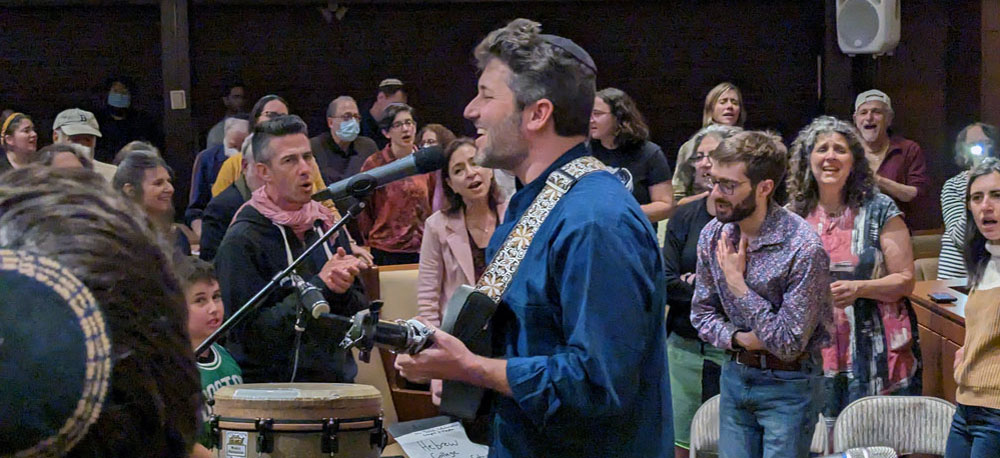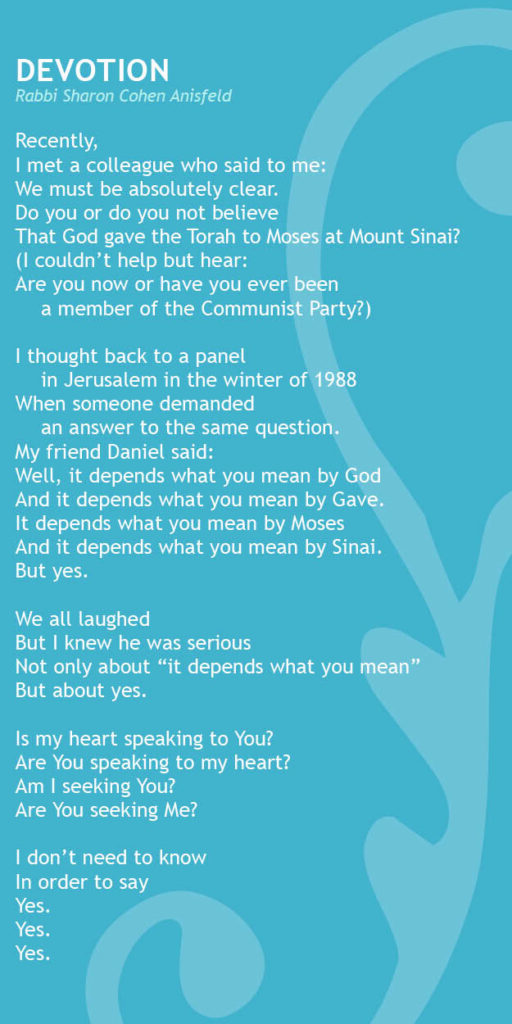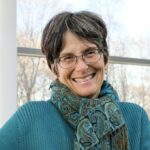Jewish learning Blessing for the Month of Sivan: A Listening Silence in the Soul

Last night, 350 people from throughout the Greater Boston community gathered on our new shared campus in Newton, for a beautiful evening of song with Joey Weisenberg (above), the Founder of Hadar’s Rising Song Institute.
The singing was sweet, soulful, sublime. But it was the silences between the songs that I will remember for a very long time.
At the beginning of the evening, each song was followed by robust applause. People were delighted to be together, and the energy was high. But gradually, I noticed, something else started to happen. A song would end, and the silence afterwards trembled with a kind of vibrating stillness. No one wanted to interrupt that silence. It occurred to me at some point that, together, we had moved from performance into prayer.
As we enter the Hebrew month of Sivan and count these last days to the festival of Shavuot, I have been thinking a lot about the place of silence in our lives, and in our experience of encountering the divine.
 Rabbinic tradition links Shavuot to the moment of revelation at Mount Sinai. The biblical description of that moment, at first glance, seems very noisy. “On the third day, as morning dawned, there was thunder, and lightning, and a dense cloud upon the mountain, and a very loud blast of the horn; and all the people who were in the camp trembled . . . and the whole mountain trembled violently. The blare of the horn grew louder and louder.”
Rabbinic tradition links Shavuot to the moment of revelation at Mount Sinai. The biblical description of that moment, at first glance, seems very noisy. “On the third day, as morning dawned, there was thunder, and lightning, and a dense cloud upon the mountain, and a very loud blast of the horn; and all the people who were in the camp trembled . . . and the whole mountain trembled violently. The blare of the horn grew louder and louder.”
These verses are followed almost immediately by the Torah’s record of the ten commandments, or translated more literally, “the ten utterances.” These are the words that God spoke to Moses, and that Moses repeated to the people at the foot of the mountain.
To take the text seriously — and personally — is to immediately reckon with what it means to say that God spoke (or speaks) words at all, and much of rabbinic tradition wrestles with precisely that question.
Within Jewish mystical tradition, there is a profound and provocative suggestion that the only thing God spoke at Sinai was the first letter of the first word of the ten commandments. The first word — “I” — is anochi in Hebrew, and the first letter of that word is aleph, the first letter of the alphabet, the beginning of all language. As Gershom Scholem writes, “What sound is in the letter aleph? Just silence, at Sinai, just silence. To hear the aleph is to hear the silence, the preparation for all audible language.”
The implications of this teaching are beautiful and fraught and far-reaching. What it says about the open-ended nature of revelation, what it says about the unknowability of God’s will, what it says about the mystery of any meeting between an infinite God and we finite beings.
Today, I am imagining the trembling people gathered at the foot of the trembling mountain, and I am hearing the silence after the thunder and lightning and the blasts of the horn; I am hearing the silence after the song.
Rabbi Jonathan Sacks writes about the act of receiving Torah in the wilderness that, “To hear the voice of God you need a listening silence in the soul.” As we move into this month of Sivan, may we quiet the need for applause and cultivate a listening silence in the soul. May we learn to savor silence not only in solitude but in sacred community, together in trembling stillness.
 Rabbi Sharon Cohen Anisfeld is President Hebrew College in Newton, MA. She writes and teaches widely, weaving together Torah, rabbinic commentary, and contemporary poetry and literature in her wise and compassionate approach to the complexities of the human experience and the search for healing and hope in a beautiful but fractured world.
Rabbi Sharon Cohen Anisfeld is President Hebrew College in Newton, MA. She writes and teaches widely, weaving together Torah, rabbinic commentary, and contemporary poetry and literature in her wise and compassionate approach to the complexities of the human experience and the search for healing and hope in a beautiful but fractured world.

